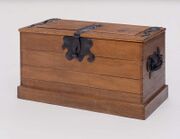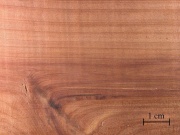Difference between revisions of "Eastern red cedar"
Jump to navigation
Jump to search
(username removed) |
|||
| (4 intermediate revisions by 2 users not shown) | |||
| Line 1: | Line 1: | ||
| − | [[File:01_EasternRedCedar.jpg|thumb|Eastern Red Cedar | + | [[File:E7835CR-d1.jpg|thumb|Red cedar chest<br>MFA# 1991.483]] |
| − | + | [[File:01_EasternRedCedar.jpg|thumb|Eastern Red Cedar (''Juniperus virgiana'')]] | |
| − | (''Juniperus virgiana'')]] | ||
== Description == | == Description == | ||
An evergreen tree, ''Juniperus virginiana'', native to eastern North America. Eastern red cedar contains an aromatic, volatile oil that makes it resistant to rotting and repulsive to insects. It has dark reddish brown heartwood and whitish sapwood. The medium strength timber was extensively used for pencils, fence posts, and cabinets. It was also cut in thin sheets for use as veneer. The eastern red cedar is now scarce and rarely used. | An evergreen tree, ''Juniperus virginiana'', native to eastern North America. Eastern red cedar contains an aromatic, volatile oil that makes it resistant to rotting and repulsive to insects. It has dark reddish brown heartwood and whitish sapwood. The medium strength timber was extensively used for pencils, fence posts, and cabinets. It was also cut in thin sheets for use as veneer. The eastern red cedar is now scarce and rarely used. | ||
| − | + | * For Eastern Red Cedar fiber identification, see http://cameo.mfa.org/wiki/Category:FRIL:_Eastern_Red_Cedar | |
== Synonyms and Related Terms == | == Synonyms and Related Terms == | ||
''Juniperus virginiana''; cèdre de Virginie (Fr.); zimbro-da-Virgínia (Port.); pencil cedar; red cedar; southern red cedar; red juniper | ''Juniperus virginiana''; cèdre de Virginie (Fr.); zimbro-da-Virgínia (Port.); pencil cedar; red cedar; southern red cedar; red juniper | ||
| + | ==Physical and Chemical Properties== | ||
| + | * Color: heartwood is reddish or violet-brown; sapwood is pale yellow; can be cut with streaks and stripes | ||
| + | * Grain/texture: Straight grain with fine, even texture; knows can be present | ||
| + | * Durability: Very resistant to rot and insect attack. | ||
| + | * Odor: Distinct with after scent; commonly used in closets to repel insects. | ||
| + | |||
| + | ==Working Properties== | ||
| + | * Easy to work, notwithstanding any knots or irregularities present in the wood. | ||
| + | * High silica content can dull cutters. | ||
| + | * Glues and finishes well, though in many applications, the wood is left unfinished to preserve its aromatic properties. | ||
| + | |||
| + | == Resources and Citations == | ||
| − | + | * The Wood Database: [https://www.wood-database.com/eastern-red-cedar/ Eastern red cedar] | |
| + | * Alden Identification Services, Microscopic Wood Identification: [https://wood-identification.com/wood-types/ Link] | ||
* ''Dictionary of Building Preservation'', Ward Bucher, ed., John Wiley & Sons, Inc., New York City, 1996 | * ''Dictionary of Building Preservation'', Ward Bucher, ed., John Wiley & Sons, Inc., New York City, 1996 | ||
| − | * ''Encyclopedia Britannica'', http://www.britannica.com Comment: "Eastern Red Cedar." | + | * ''Encyclopedia Britannica'', http://www.britannica.com Comment: "Eastern Red Cedar." 18 Aug. 2004 . |
[[Category:Materials database]] | [[Category:Materials database]] | ||
Latest revision as of 11:13, 1 August 2022
Description
An evergreen tree, Juniperus virginiana, native to eastern North America. Eastern red cedar contains an aromatic, volatile oil that makes it resistant to rotting and repulsive to insects. It has dark reddish brown heartwood and whitish sapwood. The medium strength timber was extensively used for pencils, fence posts, and cabinets. It was also cut in thin sheets for use as veneer. The eastern red cedar is now scarce and rarely used.
- For Eastern Red Cedar fiber identification, see http://cameo.mfa.org/wiki/Category:FRIL:_Eastern_Red_Cedar
Synonyms and Related Terms
Juniperus virginiana; cèdre de Virginie (Fr.); zimbro-da-Virgínia (Port.); pencil cedar; red cedar; southern red cedar; red juniper
Physical and Chemical Properties
- Color: heartwood is reddish or violet-brown; sapwood is pale yellow; can be cut with streaks and stripes
- Grain/texture: Straight grain with fine, even texture; knows can be present
- Durability: Very resistant to rot and insect attack.
- Odor: Distinct with after scent; commonly used in closets to repel insects.
Working Properties
- Easy to work, notwithstanding any knots or irregularities present in the wood.
- High silica content can dull cutters.
- Glues and finishes well, though in many applications, the wood is left unfinished to preserve its aromatic properties.
Resources and Citations
- The Wood Database: Eastern red cedar
- Alden Identification Services, Microscopic Wood Identification: Link
- Dictionary of Building Preservation, Ward Bucher, ed., John Wiley & Sons, Inc., New York City, 1996
- Encyclopedia Britannica, http://www.britannica.com Comment: "Eastern Red Cedar." 18 Aug. 2004 .

